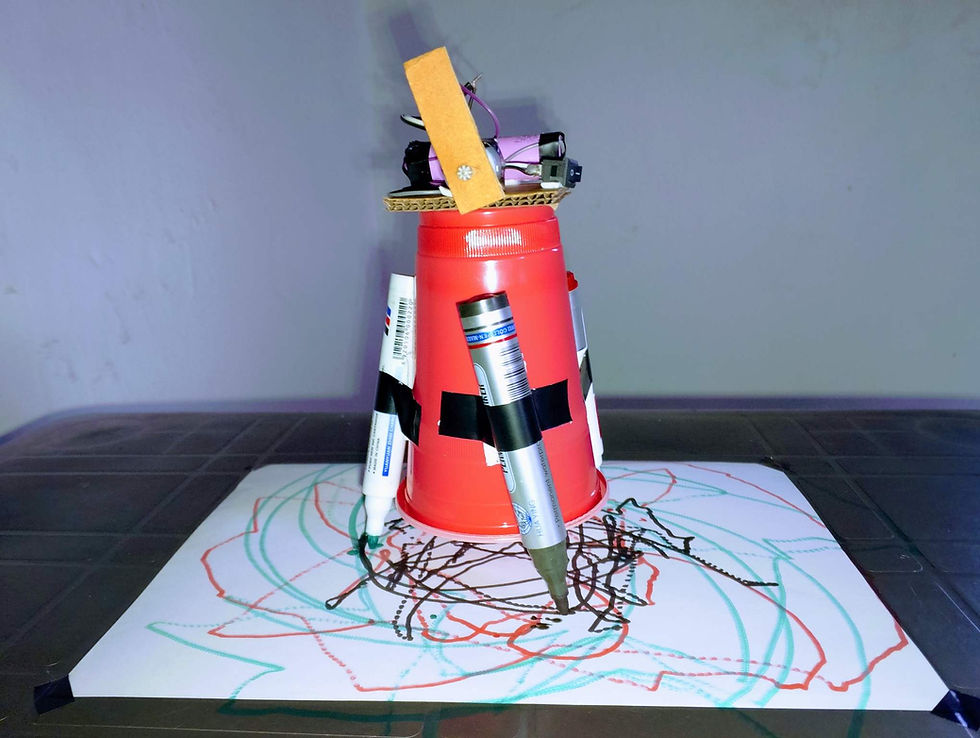Projects to do at Home with Kids: How to make a Barometer at Home
- jude nkereuwem

- Mar 27, 2023
- 3 min read

Introduction
Hello!! Welcome to Makersgeneration.
We are your go-to source for all things related to Science projects and classes for kids; from basic to intermediate and advanced levels. We are dedicated to providing information and insightful content on making cool science stuff with household items (Home science).
In today's tutorial, we will learn how to make a barometer at home using a glass jar, a balloon, and a straw. Sounds cool right?!! Continue reading to find out how. This cool STEM project will show us how weather forecasters can use a barometer to predict the change in weather over the next few days. if the rain is coming or not.
This is one of the weather experiments for kids featured on this platform.
Atmospheric pressure - Barometer
The atmosphere is the layer of air wrapped around Earth. Atmospheric pressure is the pressure exerted by the weight of the atmosphere.
A barometer is a scientific instrument used to measure this atmospheric pressure, also called barometric pressure.
A barometer with a high and stable reading indicates high pressure, so we can expect sunny weather, while a barometer with a downward indicates a low-pressure, and we can expect cloudy weather.
With our little homemade barometer, we should know how much atmospheric pressure is acting on our body Lol...!!

Barometer (wikiHow)
Materials needed
Glass jar
Scissors
Balloon
Rubber band
Tape
Straw
Ruler
Pencil
Card stock

Setting up our Barometer
It is now time to put our barometer together using the materials we've gathered.
Step 1
Cut off the neck of the balloon with scissors.

Step 2
Stretch the bigger part of the balloon and cover the opening of your glass jar. (Make sure your balloon has a smooth flat surface over the jar)

Step 3
Using a rubber band, secure the balloon over the glass jar to make the jar air-tight (No air can escape from the jar)

Step 4
Place your straw horizontally on the balloon with one end at the middle of the balloon. Cut a small piece of tape to secure the straw in place.


Step 5
To make our pressure scale, fold your card stock in half so you get a rectangle (your card stock should roughly be twice the height of your glass jar).

Step 6
To calibrate our scale, use a ruler and pencil to draw lines 1/2 inch apart across one side of the folded card stock. Towards the top section of our card stock.


We can indicate "Sunny" - High pressure and "Cloudy" - Low-pressure sections as shown below:

Step 7
Now, place your calibrated card stock (scale) alongside your glass jar (with the side labeled "Sunny" facing upwards"). Align the straw accordingly and we now have a working barometer.

The straw will be level at first, but it will either go up or down depending on the pressure.
How it works
Basically, the straw acts as a reading needle while the calibrated card stock act as a scale.
Low Pressure: Cloudy weather
When the weather is cloudy or rainy, the atmospheric pressure is low (the air molecules outside and inside the jar can move freely).
Due to this, the air molecules outside the glass press lightly on the balloon, since they have enough space to move about, while the air inside the glass jar has a restricted area to move about freely, so they press against the balloon, which will make the straw point downwards.
High Pressure: Sunny weather
When the weather is clear or sunny, the atmospheric pressure is high (the air molecule outside and inside the jar are closely packed).
Due to this, the air molecules outside the glass press down on the balloon since they have much pressure as the air molecules are close together. The air inside the glass also closely packed gives room for the balloon to push inside the jar due to the pressure from outside. This then makes the straw point downwards.

Other cute things to make and hand-crafts for kids
If you are looking for more tiny crafts and stuff to do with your kids, take a look at these other activities:
Newsletter, follow, subscribe, and like the social media
If you like STEM challenges and Science activities, consider following us on Social media for the latest updates, and don't miss any STEM events. Don't forget to also subscribe to our newsletter at the bottom of our website ''www.makersgeneration.net'' for more events, tutorials, and freebies.
Stay tuned for the coming online STEM activities for your children. It will go from coding (python, Scratch, etc) to robotics, 3D design, making video games, and much more. So, subscribe to the newsletter to not miss a piece of it. ;-)
Subscribe to the Facebook group if you have yet registered. Content and tutorials are shared daily: Create and build STEM projects for kids
We can be reached at: contact@makersgeneration.net if any questions.
See you soon.




























コメント